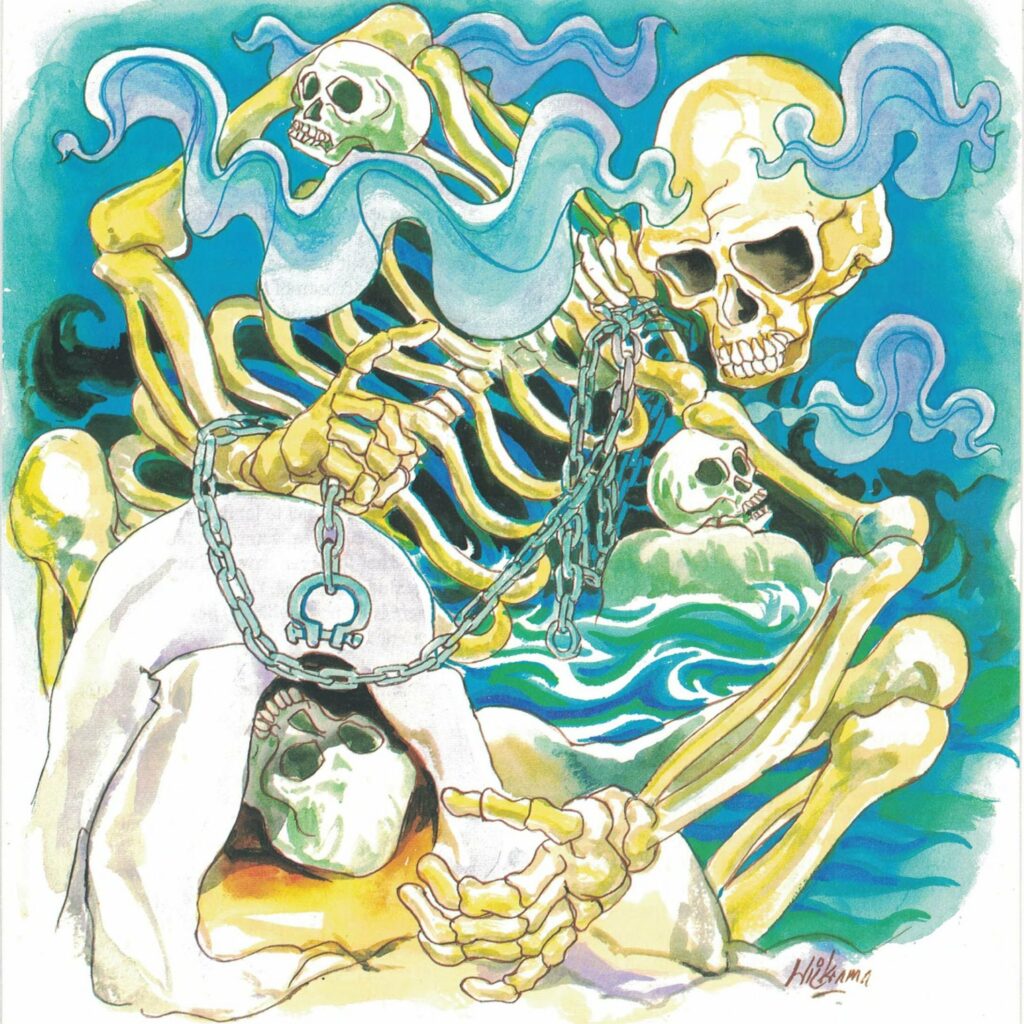Pali text, illustration and English translation of Dhammapada verse 128:
na antalikkhe na samuddamajajhe |
na pabbatānaṃ vivaraṃ pavissa |
na vijjati so jagatippadeso |
yatthaṭthitaṃ nappasahetha maccu || 128 ||
128. Neither in sky nor surrounded by sea, nor by dwelling in a mountain cave, nowhere is found that place on earth where one’s by death not overcome.

The Story of King Suppabuddha
While residing at the Nigrodhārāma Monastery, the Buddha spoke this verse, with reference to King Suppabuddha.
King Suppabuddha was the father of Devadatta and father-in-law of Prince Siddhartha who later became Gotama Buddha. King Suppabuddha was very antagonistic to the Buddha for two reasons. First, because as Prince Siddhattha he had left his wife Yasodharā, the daughter of King Suppabuddha, to renounce the world; and secondly, because his son Devadatta, who was admitted into the Order by Gotama Buddha, had come to regard the Buddha as his arch enemy. One day, knowing that the Buddha would be coming for alms-food, he got himself drunk and blocked the way. When the Buddha and the monks came, Suppabuddha refused to make way, and sent a message saying, I cannot give way to Samana Gotama, who is so much younger than me.” Finding the road blocked, the Buddha and the monks turned back. Suppabuddha then sent someone to follow the Buddha secretly and find out what the Buddha said, and to report to him.
As the Buddha turned back, he said to Ānanda, “Ānanda, because King Suppabuddha refused to give way to me, on the seventh day from now he will be swallowed up by the earth, at the foot of the steps leading to the pinnacled hall of his palace.” The king’s spy heard these words and reported to the king. And the king said that he would not go near those steps and would prove the words of the Buddha to be wrong. Further, he instructed his men to remove those steps, so that he would not be able to use them; he also kept some men on duty, with instructions to hold him back should he go in the direction of the stairs.
When the Buddha was told about the king’s instructions to his men, he said, “Monks! Whether King Suppabuddha lives in a pinnacled tower, or up in the sky, or in an ocean or in a cave, my word cannot go wrong; King Suppabuddha will be swallowed up by the earth at the very place I have told you.”
On the seventh day, about the time of the alms meal the royal horse got frightened for some unknown reason and started neighing loudly and kicking about furiously. Hearing frightening noises from his horse, the king felt that he must handle his pet horse and forgetting all precautions, he started towards the door. The door opened of its own accord, the steps which had been pulled down earlier were also there, his men forgot to stop him from going down. So the king went down the stairs and as soon as he stepped on the earth, it opened and swallowed him up and dragged him right down to Avīci Hell. Thus, no matter how hard he tried, the foolish king was unable to escape the effects of his evil kamma.
Explanatory Translation (Verse 128)
yatthaṭṭhitaṃ maccu nappasahetha so jagatippadeso
na vijjati antalikkhe na samuddamajjhe
na pabbatānaṃ vivaraṃ pavissa na
yattha: somewhere; ṭhitaṃ [ṭhita]: taking shelter; maccu: by Death; nappasahetha: will not be overwhelmed; so: that kind of; jagatippadeso [jagatippadesa]: spot on earth; na vijjati: is not seen; antalikkhe: out in space; na: there is no such place; samuddamajjhe na: nor in the middle of the ocean; pabbatānaṃ [pabbatāna]: of mountains; vivaraṃ [vivara]: cleft, crevice or opening; pavissa: having entered; na: one cannot escape
Not in the sky, nor in the ocean midst, not even in a cave of a mountain rock, is there a hiding place where one could escape death.
Commentary and exegetical material (Verse 128)
nappasahetha maccu: place where death cannot overcome a person. The implication of the stanza is that there is no place whatsoever on Earth where death cannot overcome a person. In positive terms, there is no escape from death, wherever one went.